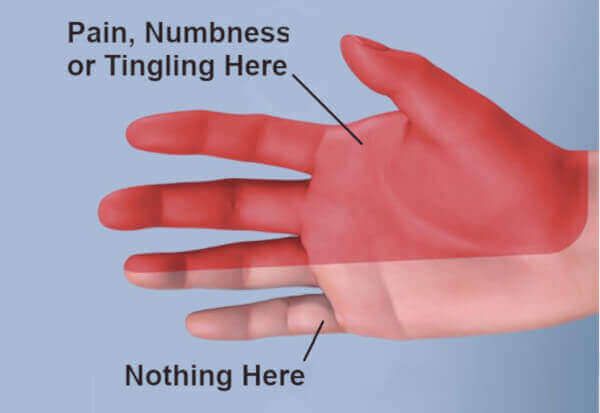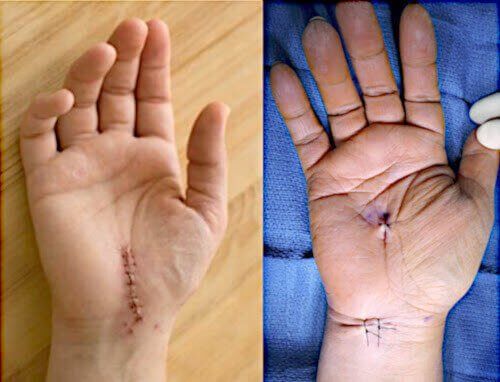Amazing Facts About Carpal Tunnel
From Dr. Z - Carpal tunnel syndrome specialist
Amazing Facts About Carpal Tunnel Syndrome
I’m always surprised how people confuse myths and facts about carpal tunnel syndrome. I hear patient stories about hand pain and numbness all day long, especially about strange treatments people use. The myths and facts get so mixed up and confusing that it's hard for patients to get the proper treatment they need. The result is that many patients are frustrated and become unable to help themselves.
In their frustration, many end up just not seeking treatment at all. Unfortunately, that’s the worst thing they can do for carpal tunnel.
I’ve compiled some of the most common facts about carpal tunnel - and many of the more common myths. My goal is to validate the facts and expose the myths. I will explain what's correct and what isn't
– and what may be potentially harmful.
- FIND OUT: do you have carpal tunnel?
No strings attached self-test.
About the condition
Carpal tunnel syndrome is curable. False:
Carpal tunnel syndrome is a disease with no cure. However, you can treat it very effectively. Like diabetes, once you have it you always have it. This is one of the main facts about carpal tunnel syndrome most people do not grasp.
Carpal tunnel syndrome is not a disease. False:
The “syndrome” part of the name has stuck in the medical and popular literature. So it’s more traditional than accurate. The characteristics of carpal tunnel syndrome are more like a disease.
Doctors properly diagnose most cases of carpal tunnel. False:
Over 85% of patients who get a diagnosis of carpal tunnel actually have another condition. This high rate of misdiagnosis might be a leading cause of the high incidence of failed carpal tunnel release surgeries.
About getting carpal tunnel
Overwork causes carpal tunnel syndrome. False:
Like diabetes, you’re either prone to getting carpal tunnel or you’re not. And like diabetes, carpal tunnel is "triggered". Overwork and strain can trigger the onset of symptoms, just like obesity triggers the onset of diabetes. So the cause of the disease has nothing to do with its trigger.
Keyboarding causes carpal tunnel syndrome.
False:
This is one of the facts about carpal tunnel syndrome that most people believe - including doctors. However, as with diabetes, you’re either predisposed to getting this disease or you’re not. And like diabetes, an external factor can trigger it but won't cause it. Overwork and strain can trigger the onset of carpal tunnel syndrome, just like obesity triggers the onset of diabetes. (Sure, it sounds like a subtle distinction, but physiologically it's quite important.)
Most hand pain is due to carpal tunnel syndrome. False:
While carpal tunnel syndrome is very common, there are other conditions that usually cause hand pain. Arthritis is the most notable example.
Carpal tunnel mostly occurs in assembly line workers. False:
Carpal tunnel syndrome can occur in anybody. Assembly line workers are at higher risk for developing the disorder. The people who work in high risk jobs requiring repetitive hand tasks are most vulnerable.
Since more manual laborers are men, they’re more likely to get carpal tunnel. False:
Published data shows men are 3 times less likely than women to develop carpal tunnel syndrome. In fact, when the data are normalized, women are over 20 times more prone to developing this condition. That makes it a women’s condition.
Myths & facts about carpal tunnel symptoms
It’s hard to tell carpal tunnel from other conditions like tendonitis. False:
Carpal tunnel syndrome has well-defined characteristics and symptoms. An experienced doctor can tell the difference, and will not likely misdiagnose it.
The symptoms will just go away.
Maybe:
Under some conditions, symptoms of carpal tunnel syndrome will disappear spontaneously. But this is not the rule. Usually the patient has to perform some self-treatments including rest, night bracing, stretching, and massage.
I must change jobs or give up my hobbies. False:
While having carpal tunnel is associated with working certain jobs, it’s not a solid correlation. So long as you take proper care of your hands, your job or hobbies don’t have to suffer.
The pain and numbness are just part of growing old. False:
Old age by itself does not cause hand or finger pain and numbness. (It’s like incorrectly saying old age causes senility.) These are symptoms of pathology, like carpal tunnel syndrome.
I got carpal tunnel while pregnant, and it will be permanent. False:
One of the major facts about carpal tunnel syndrome is that it's a common issue in pregnancy. In fact, most women experience some level of carpal tunnel symptoms during pregnancy. But in 50% of them it completely disappears immediately after childbirth. In another 25%, it disappears within 6 months. Only 25% have persistent symptoms.
Writer’s cramp is a symptom of carpal tunnel syndrome. False:
Writer’s cramp is a type of repetitive stress injury. It's a lack of muscular coordination accompanied by ache and pressure in the fingers, wrist, or forearm. It is not carpal tunnel syndrome.
Myths & facts about carpal tunnel treatments
Wearing a wrist brace cures carpal tunnel. False:
Carpal tunnel syndrome cannot be cured. Wearing a night brace keeps the wrist from moving and allows it to rest. Therefore it reduces swelling. Wearing a wrist brace at night will only alleviate some of the symptoms but will not eliminate the problem.
Bee stings on the fingers relieve pain.
False:
Bee venom therapy has never been validated to be effective for relieving carpal tunnel syndrome. However, it has been shown effective for treating some other conditions .
Steroid injections will cure carpal tunnel. False:
Carpal tunnel syndrome is a disease with no known cure. Carpal tunnel steroid shots will reduce the size of swollen tendons. That in turn eases the crowding inside the carpal tunnel. And that relieves pressure on the median nerve and the subsequent symptoms. But the effect is not permanent. After a few weeks to months from getting the shot, the swelling returns.
I must see a doctor when symptoms appear. False:
Most symptoms will disappear on their own if you take simple measures. You can perform various self-treatment methods to relieve symptom. And if you see a doctor, he or she should recommend self-treatment methods first anyway. But it’s important to see a doctor if your symptoms worsen or you cannot relieve them on your own.
You can’t self-treat carpal tunnel symptoms. False:
This is another one of those facts about carpal tunnel that few people appreciate. Most doctors, therapists, and even the American Academy of Orthopedic Surgeons say there are plenty of proven self-help remedies to alleviate symptoms. Most of the time, they work extremely well. When used correctly, these methods commonly relieve symptoms fully and permanently.
Exercising can’t relieve carpal tunnel. False:
Finger, hand, and wrist stretching exercises are among the best ways to treat mild carpal tunnel syndrome. In fact, most medical experts agree that stretching exercises are the preferred way to treat initial symptoms.
Good ergonomics can cure carpal tunnel syndrome. False:
Carpal tunnel syndrome is a disease with no known cure. You can only relieve its symptoms. Making ergonomic changes can prevent this condition from occurring in the first place. But these measures will not cure the disorder once it appears.
Myths & facts about carpal tunnel surgery
Surgery cures carpal tunnel syndrome. False:
Most people assume this is one of the given facts about carpal tunnel - but they're wrong. Surgery does not cure carpal tunnel syndrome. In fact, nothing can cure it. That’s because it’s a disease that has no cure. It’s like saying insulin cures diabetes. It doesn’t, but only treats the disease. Surgery is only one treatment option for carpal tunnel syndrome.
My surgeon knows best.
Maybe:
You should always consider your doctor’s advice. But doctors – particularly surgeons – are frequently wrong about diagnosing carpal tunnel syndrome. In fact, surgeons misdiagnose this condition almost half of the time. Always seek a second opinion.
I have carpal tunnel because my doctor says so. Maybe:
Doctors frequently misdiagnose carpal tunnel syndrome when the patient merely has tendonitis or arthritis. In fact, medical studies have shown that up to 85% of patients diagnosed with carpal tunnel have another condition instead.
Surgery will eliminate symptoms. False:
Carpal tunnel surgery is effective only about 50% of the time. That’s according to patient satisfaction rates at 2-3 years post-surgery. The low effectiveness rate is due to overall unsatisfactory results, return of symptoms, failure to relieve symptoms, and surgical complications. In addition, hand weakness or the need for additional surgery or extended hand therapy also affect effectiveness rates.
Carpal tunnel surgery is like a dental procedure; fast and simple. False:
Carpal tunnel release is major surgery. It has significant risks and dangers. Also, recovery often takes months, requiring hand rehabilitation. You will not be able to use your hand for many days post-surgery. Then you can only perform light activities for about 2-4 weeks. Finally, only 10-23% of patients who have surgery return to their former jobs. The rest must find other employment.
Carpal tunnel release surgery is successful most of the time. False:
Published success rates vary, mostly because there is a wide range of definitions for “success”. However, statistics show surgery fails to alleviate all symptoms almost 50% of the time by year 2-3.
Carpal tunnel syndrome won’t come back after surgery. False:
Recurrence of symptoms is not unusual. Overall, by 2-3 years after surgery, most patients are unsatisfied with their results. And about half require another surgery.







